Here is the rundown of stories:
“A Rondel”
“An Introduction” (which includes the story “The Wedding Present”)
“Chivalry”
“Nicholas Was …”
“The Price”
“Troll Bridge”
“Don’t Ask Jack”
“The Goldfish Pool and Other Stories”
“The White Road”
“Queen of Knives”
“Changes”
“The Daughter of Owls”
“Shoggoth’s Old Peculiar”
“Virus”
“Looking for the Girl”
“Only the End of the World Again”
“Bay Wolf”
“We Can Get Them for You Wholesale”
“One Life, Furnished in Early Moorcock”
“Cold Colors”
“The Sweeper of Dreams”
“Foreign Parts”
“Vampire Sestina”
“Mouse”
“The Sea Change”
“When We Went to See the End of the World: by Dawnie Morningside, age 11 1/4″
“Desert Wind”
“Tastings”
“Babycakes”
“Murder Mysteries”
“Snow, Glass Apples”
To be truthful, I skipped a few stories. Probably half a dozen. The reason: I had read them before. Though more truthfully, two of them (the last two stories) are in audio book form. They are a part of “Two Plays for Voices”. What is cool about this collection is that each character has a different actor/actress voicing them. Brian Dennehy plays angel Raguel in “Murder Mysteries”, a story about the death of an angel before the creation of the world. And Bebe Neuwirth plays the Queen in “Snow, Glass Apples”, dealing with the inhuman daughter of the late King. Both were excellently done in audio form.
To get back on track, for those not familiar with Neil Gaiman, he is a British modern fantasy author who now lives in Minnesota. His novel “Neverwhere” is one of my favorites, and he won the Hugo and Nebula awards for “American Gods”. He is also the man behind the “Sandman” graphic novels. His style is filled with humor, but they tend to be very dark and maddening. Or just weird and strange.
“Chivalry” is a great way to start the collection, if you skip introductions (the reason he put “The Wedding Present” within it). It is about an elderly English woman who always goes shopping at the local thrift store and one day happens to by the Holy Grail. Soon Galaad shows up for it, wanting to take it back to King Arthur. It shows the more humorous side of his work.
“The Wedding Present” was a great look at how he can stay with a very modern theme and add his twist of darkness to it. This one was less fantastical, yet it really stuck out. It is a rather heartbreaking story.
All the other stories are good to excellent. There are twists of humor (though again still dark) with the likes of “Bay Wolf” where a Beowulf like character lives near the bay in southern California, where he hunts down Grand Al (Grendel). “Virus” pokes fun at those obsessed with video games. “Changes” was very sci-fi like, where a doctor discovers a way to cure cancer, but it changes the sex of the person. Soon it becomes a black market drug that people use, and eventually everyone uses it. “One Life, Furnished in Early Moorcock” is a nice little tribute to author Michael Moorcock. (As a matter of fact, it made me want to start reading more of his Elric series.) And “Nicholas Was …” is a hilarious rendition of the truth behind Santa Claus. If it wasn’t for the fact that I could get in trouble, I would seriously post the whole story, since it is only 100 words long.
Like everything that I have read of Gaiman’s, there was so much to enjoy about this. Some of the stories weren’t wonderful, but everything was at least good. He has to be one of the most original writers in the game today. Even if he borrows themes. Because most authors in fantasy do borrow bits. But Gaiman does so much more with them.
"Smoke and Mirrors" by Neil Gaiman
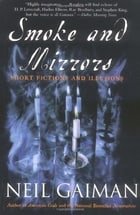 Posted : 17 years, 4 months ago on 21 February 2008 02:24
(A review of Smoke and Mirrors: Short Fictions and Illusions)
Posted : 17 years, 4 months ago on 21 February 2008 02:24
(A review of Smoke and Mirrors: Short Fictions and Illusions) 0 comments, Reply to this entry
0 comments, Reply to this entry
"Thirteen Moons" by Charles Frazier
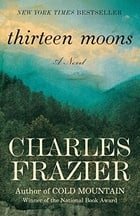 Posted : 17 years, 4 months ago on 21 February 2008 02:21
(A review of Thirteen Moons)
Posted : 17 years, 4 months ago on 21 February 2008 02:21
(A review of Thirteen Moons)Nine years in the making, this is the much anticipated follow-up to Frazier's debut novel "Cold Mountain".
From Amazon.Com and Publishers Weekly, here is a write up of the book:
---
… a bountiful literary panorama again set primarily in North Carolina’s Great Smoky Mountains. The story takes place mostly before the Civil War this time, and it is epic in scope. With pristine prose that’s often wry, Frazier brings a rough-and-tumble pioneer past magnificently to life, indicts America with painful bluntness for the betrayal of its native people and recounts a romance rife with sadness. In a departure from “Cold Mountain’s” Inman, Will Cooper narrates his own story in retrospect, beginning with his days as an orphaned, literate “bound boy” who is dispatched to run a musty trading post at the edge of the Cherokee Nation. Nearly nine mesmerizing decades later, Will is an eccentric elder of great accomplishments and gargantuan failures, perched cantankerously on his front porch taking potshots at passenger trains rumbling across his property (he owns “quite a few” shares of the railroad). Over the years, Will - modeled very loosely, Frazier acknowledges, on real-life frontiersman William Holland Thomas - becomes a prosperous merchant, a self-taught lawyer and a state senator; he’s adopted by a Cherokee elder and later leads the clan as a white Indian chief; he bears terrible witness to the 1838-1839 Trail of Tears; a quarter-century later, he goes to battle for the Confederacy as a self-anointed colonel, leading a mostly Indian force with a “legion of lawyers and bookkeepers and shop clerks” as officers; as time passes, his life intersects with such figures as Davy Crockett, Sen. John C. Calhoun and President Andrew Jackson. After the Civil War, Will fritters away a fortune through wanderlust, neglect and unquenched longing for his one true love, Claire, a girl he won in a card game when they were both 12, wooed for two erotic summers in his teen years and found again several decades later. In the novel’s wistful coda, recalling Claire’s voice inflicts “flesh wounds of memory, painful but inconclusive”—a voice that an uncertain old Will hears in the static hiss when he answers his newfangled phone in the book’s opening pages.
---
It’s funny how some people are reacting to this book. Unfortunately in the literary world, Frazier made a huge splash with “Cold Mountain”. I enjoyed the book, too. But it seems that many haven’t been happy with Frazier’s second offering. The shame of that is that “Thirteen Moons” in some respects is better. Frazier has given us a great first person perspective story that spans many years. He develops Will’s character with such ease it seems, and keeps him consistent. So what is there not to like?
At times it is not exciting to read “Thirteen Moons”. We don’t have Inman running away from a war to get back to the only woman he realizes he loved. And we don’t have the decaying life of Ada, hoping to see her dear Inman again. We are not working to any great goal. All we have is Will’s life. Little and big triumphs and failures, told by the man himself. Sure, it doesn’t move fast at times. And I didn’t find myself clamoring to read the book at times. However, this is a very good piece of literature. If the reader goes in looking for some grand love story, or a chase, then they will be disappointed. They need to sit back and take in Frazier’s prose and development of a grand story.
There is much to enjoy about this book, which I found. And maybe it helped that I heard all the comments about how this book was much less in stature compared to his debut. But sometimes I just think people expect too much.
From Amazon.Com and Publishers Weekly, here is a write up of the book:
---
… a bountiful literary panorama again set primarily in North Carolina’s Great Smoky Mountains. The story takes place mostly before the Civil War this time, and it is epic in scope. With pristine prose that’s often wry, Frazier brings a rough-and-tumble pioneer past magnificently to life, indicts America with painful bluntness for the betrayal of its native people and recounts a romance rife with sadness. In a departure from “Cold Mountain’s” Inman, Will Cooper narrates his own story in retrospect, beginning with his days as an orphaned, literate “bound boy” who is dispatched to run a musty trading post at the edge of the Cherokee Nation. Nearly nine mesmerizing decades later, Will is an eccentric elder of great accomplishments and gargantuan failures, perched cantankerously on his front porch taking potshots at passenger trains rumbling across his property (he owns “quite a few” shares of the railroad). Over the years, Will - modeled very loosely, Frazier acknowledges, on real-life frontiersman William Holland Thomas - becomes a prosperous merchant, a self-taught lawyer and a state senator; he’s adopted by a Cherokee elder and later leads the clan as a white Indian chief; he bears terrible witness to the 1838-1839 Trail of Tears; a quarter-century later, he goes to battle for the Confederacy as a self-anointed colonel, leading a mostly Indian force with a “legion of lawyers and bookkeepers and shop clerks” as officers; as time passes, his life intersects with such figures as Davy Crockett, Sen. John C. Calhoun and President Andrew Jackson. After the Civil War, Will fritters away a fortune through wanderlust, neglect and unquenched longing for his one true love, Claire, a girl he won in a card game when they were both 12, wooed for two erotic summers in his teen years and found again several decades later. In the novel’s wistful coda, recalling Claire’s voice inflicts “flesh wounds of memory, painful but inconclusive”—a voice that an uncertain old Will hears in the static hiss when he answers his newfangled phone in the book’s opening pages.
---
It’s funny how some people are reacting to this book. Unfortunately in the literary world, Frazier made a huge splash with “Cold Mountain”. I enjoyed the book, too. But it seems that many haven’t been happy with Frazier’s second offering. The shame of that is that “Thirteen Moons” in some respects is better. Frazier has given us a great first person perspective story that spans many years. He develops Will’s character with such ease it seems, and keeps him consistent. So what is there not to like?
At times it is not exciting to read “Thirteen Moons”. We don’t have Inman running away from a war to get back to the only woman he realizes he loved. And we don’t have the decaying life of Ada, hoping to see her dear Inman again. We are not working to any great goal. All we have is Will’s life. Little and big triumphs and failures, told by the man himself. Sure, it doesn’t move fast at times. And I didn’t find myself clamoring to read the book at times. However, this is a very good piece of literature. If the reader goes in looking for some grand love story, or a chase, then they will be disappointed. They need to sit back and take in Frazier’s prose and development of a grand story.
There is much to enjoy about this book, which I found. And maybe it helped that I heard all the comments about how this book was much less in stature compared to his debut. But sometimes I just think people expect too much.
 0 comments, Reply to this entry
0 comments, Reply to this entry
"Cold Mountain" by Charles Frazier
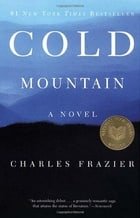 Posted : 17 years, 4 months ago on 21 February 2008 02:17
(A review of Cold Mountain)
Posted : 17 years, 4 months ago on 21 February 2008 02:17
(A review of Cold Mountain)This is the first time in a long time that I have read the book AFTER seeing the movie. The last time I did that was “The Hunt for Red October”, where both book and movie were very good. This one, to me at least, has proven to be the same. Obviously it becomes anti-climatic, knowing the end. At least with seeing the movie after there is a sense of wonder of how the director will handle the scenes, or if they even make the cut.
The biggest difference between the movie and book was the focus of character. The movie seemed to focus on the townsfolk of Cold Mountain and how the Civil War effected them, though mostly Ada and Inman. But the book almost exclusively focuses on Ada and Inman with very little of others, though Ruby gets her fair share of time. The movie stretched out more of the characters.
However, as always, the book is better then the movie. We see the great depths of character of especially Inman. The reader gets a full account of his mindset, of his passions and emotions, or his deep desire to be with Ada, and for the war to end. How he has seen more then he wants to see, and how it haunts his every step.
There is also the added plus of Frazier’s writing style that makes the book better. Especially if you enjoy reading. The prose has an aire about it that is poetic, yet still down to earth. We are talking about a time when some individuals where not well educated. So even though some of the characters talk with a stereotypical southern dialect, the naration’s lines mix well to make it all sing. One of the comments on the cover of the book was from Newsweek and states that this story borders on being called literature and not just fiction. In some respects I agree, though my experience with true literature is minimal. Frazier’s prose however is what separates this from many other books.
There is one hang-up though. Some may find it hard to follow. I did at first, but soon grew accustomed to it. It’s the fact that there are no quotes in the book at all. So when someone speaks, it’s almost as if the narator (which is third person and unnamed) is just telling the story. For instance:
Without pausing even for salutation Inman said, Who put out your pair of eyes?
The only time you get some idea that someone is “speaking” is when it happens at the beginning of a paragraph. There you get a dash before the text.
—Nobody, said the blind man with a friendly smile on his face. I never had any.
Like I said, this may annoy the daylights out of some.
The reason I wanted to go back and read the book was because I enjoyed the movie so much, and have continued to watch it. Anytime I would be flipping through the channels and would come across it, I would stop and watch. I had heard many good things about the book, but was worried about hype. What I got though was a great emotional read, even if I knew what was going to happen before it did. I can see though why it was so highly acclaimed.
The biggest difference between the movie and book was the focus of character. The movie seemed to focus on the townsfolk of Cold Mountain and how the Civil War effected them, though mostly Ada and Inman. But the book almost exclusively focuses on Ada and Inman with very little of others, though Ruby gets her fair share of time. The movie stretched out more of the characters.
However, as always, the book is better then the movie. We see the great depths of character of especially Inman. The reader gets a full account of his mindset, of his passions and emotions, or his deep desire to be with Ada, and for the war to end. How he has seen more then he wants to see, and how it haunts his every step.
There is also the added plus of Frazier’s writing style that makes the book better. Especially if you enjoy reading. The prose has an aire about it that is poetic, yet still down to earth. We are talking about a time when some individuals where not well educated. So even though some of the characters talk with a stereotypical southern dialect, the naration’s lines mix well to make it all sing. One of the comments on the cover of the book was from Newsweek and states that this story borders on being called literature and not just fiction. In some respects I agree, though my experience with true literature is minimal. Frazier’s prose however is what separates this from many other books.
There is one hang-up though. Some may find it hard to follow. I did at first, but soon grew accustomed to it. It’s the fact that there are no quotes in the book at all. So when someone speaks, it’s almost as if the narator (which is third person and unnamed) is just telling the story. For instance:
Without pausing even for salutation Inman said, Who put out your pair of eyes?
The only time you get some idea that someone is “speaking” is when it happens at the beginning of a paragraph. There you get a dash before the text.
—Nobody, said the blind man with a friendly smile on his face. I never had any.
Like I said, this may annoy the daylights out of some.
The reason I wanted to go back and read the book was because I enjoyed the movie so much, and have continued to watch it. Anytime I would be flipping through the channels and would come across it, I would stop and watch. I had heard many good things about the book, but was worried about hype. What I got though was a great emotional read, even if I knew what was going to happen before it did. I can see though why it was so highly acclaimed.
 0 comments, Reply to this entry
0 comments, Reply to this entry
"Midnight Men"
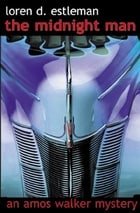 Posted : 17 years, 4 months ago on 21 February 2008 02:05
(A review of The Midnight Man (Amos Walker Mysteries))
Posted : 17 years, 4 months ago on 21 February 2008 02:05
(A review of The Midnight Man (Amos Walker Mysteries))This time around Amos Walker P.I. gets involved in a double homicide of two Detroit Police Officers, while a third is paralyzed. How it happens is rather ironic, and turns out that his investigation is free of charge. Why? Because the day before the third cop took a bullet to his spine, officer Van Sturtevant (”Van’s my first name, not part of the last.”) was shot at by Walker himself. It was part of a mix-up in what was becoming a local hi-jack ring that Walker was investigating. After finding out that Sturtevant was in critical condition, Walker stumbles across his younger and attractive wife. He hands her a card, and written on the back are the words “free of charge.” And from that point on, Amos Walker wishes he had never been so generous.
Per usual, Walker’s sarcastic, smartass tone plays well with the other characters. His now sometimes girlfirend, Iris, the exotic, dark skinned, former drug adict, hooker even says that he is too much of a wise-ass. But he just continues as he pleases.
Of the four Amos Walker books I had read at this point, I think I like this one the best. Estleman wrangled quite a few things that I had no idea were coming. And as usual he likes to bring in characters that you can’t tell which way they are going. Makes for fast, entertaining reading.
Per usual, Walker’s sarcastic, smartass tone plays well with the other characters. His now sometimes girlfirend, Iris, the exotic, dark skinned, former drug adict, hooker even says that he is too much of a wise-ass. But he just continues as he pleases.
Of the four Amos Walker books I had read at this point, I think I like this one the best. Estleman wrangled quite a few things that I had no idea were coming. And as usual he likes to bring in characters that you can’t tell which way they are going. Makes for fast, entertaining reading.
 0 comments, Reply to this entry
0 comments, Reply to this entry
"Downriver"
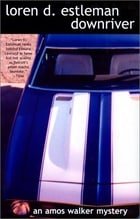 Posted : 17 years, 4 months ago on 21 February 2008 02:02
(A review of Downriver (Amos Walker Mysteries))
Posted : 17 years, 4 months ago on 21 February 2008 02:02
(A review of Downriver (Amos Walker Mysteries))The reason I picked it up in the first place was the name. (OK, so it was cheap too, being sold as a remainder.) But “Downriver” is a term used as a name of the southern suburbs of Detroit. So I picked up the book and found out quickly that the events of the book in fact take place in metro Detroit. All the Amos Walker books that Estleman writes take place in Detroit.
Being a mystery, this was new territory for me. But a very nice change of pace, seeing as I usually read sci-fi or fantasy. I found this enjoyable, and the ending was satisfying, though a bit “Hollywood” with all those involved talking things through with the murderer pointing a gun at the lot of them. I also had a thought of who the murderer was, but it still was a good read and not blatant.
The biggest draw for me of course was knowing the places the author used. Unlike other books where you have to imagine the setting using the authors description, I knew exactly what Lake Shore Drive in Grosse Pointe looks like, or have personally been through the maze of walkways through old Trapper’s Alley, or driven up Woodward Avenue in Birmingham. And though terms were used that maybe only Detroiter’s would truly understand, they never took away from the story.
The story was good enough to get me interested in reading more of the series. It is also a nice to bring a little bit of "home" to me.
Being a mystery, this was new territory for me. But a very nice change of pace, seeing as I usually read sci-fi or fantasy. I found this enjoyable, and the ending was satisfying, though a bit “Hollywood” with all those involved talking things through with the murderer pointing a gun at the lot of them. I also had a thought of who the murderer was, but it still was a good read and not blatant.
The biggest draw for me of course was knowing the places the author used. Unlike other books where you have to imagine the setting using the authors description, I knew exactly what Lake Shore Drive in Grosse Pointe looks like, or have personally been through the maze of walkways through old Trapper’s Alley, or driven up Woodward Avenue in Birmingham. And though terms were used that maybe only Detroiter’s would truly understand, they never took away from the story.
The story was good enough to get me interested in reading more of the series. It is also a nice to bring a little bit of "home" to me.
 0 comments, Reply to this entry
0 comments, Reply to this entry
"Motor City Blues"
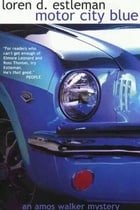 Posted : 17 years, 4 months ago on 21 February 2008 01:59
(A review of Motor City Blue (Amos Walker Mysteries))
Posted : 17 years, 4 months ago on 21 February 2008 01:59
(A review of Motor City Blue (Amos Walker Mysteries))“Motor City Blue” is the first book of the Amos Walker mystery series. It was the second I had read (“Downriver” was first). I don’t see a serious need for reading them in order, though it probably does help. One of the characters that Walker is a friend with is Police Detective John Alderdyce. In “Downriver” the readers gets little of his description. In “Motor City Blue” the reader gets a very good description, and the story behind how they know each other. Other characters show up too, either as his friends and more then likely in every book. Or as I found out at the author’s site, they appear again from time to time if it serves the story.
As I have mentioned in the other review, I usually read fantasy and sci-fi. I have wanted to branch out into just general fiction or other genres. This came upon me being based in Detroit. And like the first book I read of this series, I enjoyed this. It was also a better more complex story. The writing style is the same, and the character is much the same. Which is good for me, because I like Amos Walker.
“Motor City Blue” deals with the underground porn industry. A mafia big wig is looking for his missing “daughter” and hires Walker to find her. She appears the have gotten mixed up in the industry. Walker also gets mixed up in a murder that happens, mostly because he recognizes the guy being carried away. It all leads to him descending into the depths of a third mystery, and they all tie together.
Like I mentioned, it was a good read, as Estleman brings all the threads together very well. And as I also said before, I will be reading more of this series.
As I have mentioned in the other review, I usually read fantasy and sci-fi. I have wanted to branch out into just general fiction or other genres. This came upon me being based in Detroit. And like the first book I read of this series, I enjoyed this. It was also a better more complex story. The writing style is the same, and the character is much the same. Which is good for me, because I like Amos Walker.
“Motor City Blue” deals with the underground porn industry. A mafia big wig is looking for his missing “daughter” and hires Walker to find her. She appears the have gotten mixed up in the industry. Walker also gets mixed up in a murder that happens, mostly because he recognizes the guy being carried away. It all leads to him descending into the depths of a third mystery, and they all tie together.
Like I mentioned, it was a good read, as Estleman brings all the threads together very well. And as I also said before, I will be reading more of this series.
 0 comments, Reply to this entry
0 comments, Reply to this entry
"Angel Eyes"
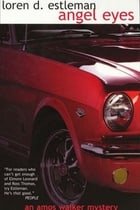 Posted : 17 years, 4 months ago on 21 February 2008 01:57
(A review of Angel Eyes (The Amos Walker Series #2))
Posted : 17 years, 4 months ago on 21 February 2008 01:57
(A review of Angel Eyes (The Amos Walker Series #2))This is the third Amos Walker book I have read, and like the other two, it is a good, quick read. Refresher, Amos Walker is a P.I. in Detroit. Served in Vietnam as an MP, and quit the Detroit Police Academy after returning from the war.
In this book, he is contacted by a go-go dancer (this takes place in like 1980 or 81) who believes she is going to be kidnapped in next couple of days or so. She schedules a meeting with Walker at her apartment after her shift. When Walker shows up he finds a guy that tried to mug him a couple of hours earlier outside of the go-go joint dead of a gunshot wound and his client missing.
Walker keeps stumbling onto murder scenes before the police do, and seems to be one step ahead of them with questioning people as well, much to the displeasure of the homicide lieutenant detective handing the case.
As before, the sense of humor is there from time to time, and as always it makes it easier to picture things since I am familiar with the setting. It probably helps make the book more enjoyable.
In this book, he is contacted by a go-go dancer (this takes place in like 1980 or 81) who believes she is going to be kidnapped in next couple of days or so. She schedules a meeting with Walker at her apartment after her shift. When Walker shows up he finds a guy that tried to mug him a couple of hours earlier outside of the go-go joint dead of a gunshot wound and his client missing.
Walker keeps stumbling onto murder scenes before the police do, and seems to be one step ahead of them with questioning people as well, much to the displeasure of the homicide lieutenant detective handing the case.
As before, the sense of humor is there from time to time, and as always it makes it easier to picture things since I am familiar with the setting. It probably helps make the book more enjoyable.
 0 comments, Reply to this entry
0 comments, Reply to this entry
"Jonathan Strange & Mr Norrell"
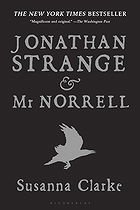 Posted : 17 years, 4 months ago on 21 February 2008 01:13
(A review of Jonathan Strange & Mr. Norrell)
Posted : 17 years, 4 months ago on 21 February 2008 01:13
(A review of Jonathan Strange & Mr. Norrell)Where to start? First, what it’s about. Two magicians in England set about to re-discover the art which has been lost for a few hundred years. This takes place in the early 19th Century, while Britain is fighting off the advancing French army led by Napoleon.
As you can imagine in being an interesting storyline, the two don’t start off as a “team” first thing in the book. Actually, Mr Norrell makes a big impression on all of England with his talent. While Jonathan Strange comes along later, after being told he is part of a prophecy.
The interaction between all the characters is quite good. And though the character development is good, I didn’t come across as really caring for all of them. At one point a character dies, and I didn’t feel any shock or the slightest twinge. It was just part of the story.
As for Ms Clarke’s style, that seems to be a hot topic. In my opinion, it is very good. Even though it is a bit of jumbled up bits of different styles. At times the book presents itself as if the narrator is sitting in front of you telling you the story. Other times it comes across as a biography or history book about the two magicians. But I found myself enjoying the the prose, and dialect of the characters.
The story itself really grabbed me at first. Right from the onset, the way things are presented and set up, I was hooked. Clarke at times would bring chapters to and end with wrapping up a problem. This gave it a biographical/historical feel to it. But other plotlines spanned chapters, if not the whole book. At times this really worked well with the book. Other times it tended to drag it down. And there was a section in the middle that I really had to push myself to get through. But once some of the plotlines were played out to develop the ending, it really cooked. The last 200 pages really made it hard to put the book down. The overall storyline really came into focus, and the events really made for good reading.
Despite it’s faults, this is quite a charming book. I know that sounds like a rather odd thing to say about a 782 page book about two English magicians during the reign of Napoleon. But it is the best way I can put it. There are things about it that scream the fact that this is Ms Clarke’s first novel and make it obvious that it took her 10 years to write it. But there are also things in it that show the brilliance of such a story and her writing and storytelling abilities.
As you can imagine in being an interesting storyline, the two don’t start off as a “team” first thing in the book. Actually, Mr Norrell makes a big impression on all of England with his talent. While Jonathan Strange comes along later, after being told he is part of a prophecy.
The interaction between all the characters is quite good. And though the character development is good, I didn’t come across as really caring for all of them. At one point a character dies, and I didn’t feel any shock or the slightest twinge. It was just part of the story.
As for Ms Clarke’s style, that seems to be a hot topic. In my opinion, it is very good. Even though it is a bit of jumbled up bits of different styles. At times the book presents itself as if the narrator is sitting in front of you telling you the story. Other times it comes across as a biography or history book about the two magicians. But I found myself enjoying the the prose, and dialect of the characters.
The story itself really grabbed me at first. Right from the onset, the way things are presented and set up, I was hooked. Clarke at times would bring chapters to and end with wrapping up a problem. This gave it a biographical/historical feel to it. But other plotlines spanned chapters, if not the whole book. At times this really worked well with the book. Other times it tended to drag it down. And there was a section in the middle that I really had to push myself to get through. But once some of the plotlines were played out to develop the ending, it really cooked. The last 200 pages really made it hard to put the book down. The overall storyline really came into focus, and the events really made for good reading.
Despite it’s faults, this is quite a charming book. I know that sounds like a rather odd thing to say about a 782 page book about two English magicians during the reign of Napoleon. But it is the best way I can put it. There are things about it that scream the fact that this is Ms Clarke’s first novel and make it obvious that it took her 10 years to write it. But there are also things in it that show the brilliance of such a story and her writing and storytelling abilities.
 0 comments, Reply to this entry
0 comments, Reply to this entry
"The Book of Lost Things"
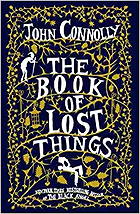 Posted : 17 years, 4 months ago on 21 February 2008 01:11
(A review of The Book of Lost Things)
Posted : 17 years, 4 months ago on 21 February 2008 01:11
(A review of The Book of Lost Things)From Publishers Weekly, here is the lowdown on the plot and their review:
---
Thriller writer Connolly turns from criminal fears to primal fears in this enchanting novel about a 12-year-old English boy, David, who is thrust into a realm where eternal stories and fairy tales assume an often gruesome reality. Books are the magic that speak to David, whose mother has died at the start of WWII after a long debilitating illness. His father remarries, and soon his stepmother is pregnant with yet another interloper who will threaten David’s place in his father’s life. When a portal to another world opens in time-honored fashion, David enters a land of beasts and monsters where he must undertake a quest if he is to earn his way back out. Connolly echoes many great fairy tales and legends (Little Red Riding Hood, Roland, Hansel and Gretel), but cleverly twists them to his own purposes. Despite horrific elements, this tale is never truly frightening, but is consistently entertaining as David learns lessons of bravery, loyalty and honor that all of us should learn.
---
The one thing that stands out most after reading this is Connolly’s ability to write. This is a very good story. It’s filled with great imaginative characters and ideas. Some are borrowed, but he makes them his own for the stories sake. And he switched gears, so to speak, for this story, previously have written very adult thrillers. This is a young adult style novel, there’s no doubt about it. Like the review says, he makes it creepy without it being really creepy.
The novel almost plays off as a fairy tale in itself. Maybe along the lines of some of Neil Gaiman’s novels/stories. Yet nothing is cliche. It all goes together well. From the very sad beginning to the very realistic sum-up at the end, it all makes for a compelling story. Nothing moves faster then it needs to, and just enough is revealed to give you what you need to know, but the drive to read more and discover what this world is that David has stepped into.
Part of this may come from my ineptitude. When one character is revealed, it was something that I felt should have seen coming. I had thought I had another character pegged, and when I was pleasantly surprised that it wasn’t, I set aside this notion and therefore was blind to what was coming. It worked out better for me that way, because it gave me more of a thrill.
---
Thriller writer Connolly turns from criminal fears to primal fears in this enchanting novel about a 12-year-old English boy, David, who is thrust into a realm where eternal stories and fairy tales assume an often gruesome reality. Books are the magic that speak to David, whose mother has died at the start of WWII after a long debilitating illness. His father remarries, and soon his stepmother is pregnant with yet another interloper who will threaten David’s place in his father’s life. When a portal to another world opens in time-honored fashion, David enters a land of beasts and monsters where he must undertake a quest if he is to earn his way back out. Connolly echoes many great fairy tales and legends (Little Red Riding Hood, Roland, Hansel and Gretel), but cleverly twists them to his own purposes. Despite horrific elements, this tale is never truly frightening, but is consistently entertaining as David learns lessons of bravery, loyalty and honor that all of us should learn.
---
The one thing that stands out most after reading this is Connolly’s ability to write. This is a very good story. It’s filled with great imaginative characters and ideas. Some are borrowed, but he makes them his own for the stories sake. And he switched gears, so to speak, for this story, previously have written very adult thrillers. This is a young adult style novel, there’s no doubt about it. Like the review says, he makes it creepy without it being really creepy.
The novel almost plays off as a fairy tale in itself. Maybe along the lines of some of Neil Gaiman’s novels/stories. Yet nothing is cliche. It all goes together well. From the very sad beginning to the very realistic sum-up at the end, it all makes for a compelling story. Nothing moves faster then it needs to, and just enough is revealed to give you what you need to know, but the drive to read more and discover what this world is that David has stepped into.
Part of this may come from my ineptitude. When one character is revealed, it was something that I felt should have seen coming. I had thought I had another character pegged, and when I was pleasantly surprised that it wasn’t, I set aside this notion and therefore was blind to what was coming. It worked out better for me that way, because it gave me more of a thrill.
 0 comments, Reply to this entry
0 comments, Reply to this entry
"The Green Age of Asher Witherow"
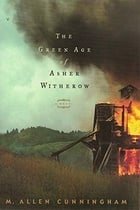 Posted : 17 years, 4 months ago on 21 February 2008 01:09
(A review of The Green Age of Asher Witherow)
Posted : 17 years, 4 months ago on 21 February 2008 01:09
(A review of The Green Age of Asher Witherow)I saw this book a little over a year ago on my recommendations list at Amazon.Com. Out of interest it made it to my wish list. Eventually as my mood changed of what I wanted to read, I deleted it. But a month ago I found myself trying to remember the name of the book and soon found it for a bargain price.
The synopsis from Publishers Weekly via Amazon.Com:
---
A miner’s son is immersed in the dark spirituality of an insular, mostly Welsh Northern California mining town in the mid-19th century in this gritty coming-of-age debut. When Asher Witherow is eight, he witnesses the burning of his best friend, Thomas Motion, in a horrific accident as the boys explore the caverns of nearby Mt. Diablo. Witherow hides his knowledge of the accident even as a search is mounted, a situation that intrigues Josiah Lyte, the boy’s bizarre schoolteacher and local preacher who eventually gets cast out by the populace for integrating Hindu elements from his upbringing in India into his work.
---
The story mostly takes place during the 1870’s, but is narrated by Asher in 1950, looking back at that life changing time of his youth. It plays well, and then it doesn’t. But given how well the story is told, I didn’t really notice this until the end. As with any story written like this, how can someone have such great recall of events that happened almost 80 years ago? Not thinking about that, the story is one to enjoy.
As for the story being well told, some of this has to do with Cunningham’s prose. The man can write. There are couple of times, given Josiah Lyte’s characteristics, that he goes too far in explaining the spiritual side of the story, of what Asher is feeling or seeing during these excursions. These sections left me a bit lost. However, I can see how some would thoroughly enjoy these passages (as well as the book as a whole). When needed, Cunningham’s style does very well in telling the story of a 19th century mining town and the doldrums and hazards of that work.
All the characters, even if not big on page time, are well done. They have traits that they keep, or are just believable. Asher and Josiah are rather well drawn out. I got a real good feeling of what and who they were. Though Josiah is a more interesting character then our narrator. Not that Asher is boring, but Josiah’s mixed bag of spirituality and how the townsfolk affect him was really engaging.
The only real downfall was near the end of the book. The last parts are gone through quickly. An argument can be made that at this point of the story the events and their affects are deep rooted and not on the mind everyday. Plus we are talking about “the green age” of Asher’s life, and he has seen more by the age of fourteen then most see in a lifetime. It is a coming-of-age story about him, after all. But with how interesting the story and characters are, I wanted to read more of their lives being played out, instead of wrapped up in neat little chapters at the end.
I am glad that I remembered this book and tried to find it again. I am particularly glad that I didn’t pay full price for it though. I wasn’t clamoring to read it every day, however still enjoyed the story as a whole, and for most part enjoyed Cunningham’s writing style.
The synopsis from Publishers Weekly via Amazon.Com:
---
A miner’s son is immersed in the dark spirituality of an insular, mostly Welsh Northern California mining town in the mid-19th century in this gritty coming-of-age debut. When Asher Witherow is eight, he witnesses the burning of his best friend, Thomas Motion, in a horrific accident as the boys explore the caverns of nearby Mt. Diablo. Witherow hides his knowledge of the accident even as a search is mounted, a situation that intrigues Josiah Lyte, the boy’s bizarre schoolteacher and local preacher who eventually gets cast out by the populace for integrating Hindu elements from his upbringing in India into his work.
---
The story mostly takes place during the 1870’s, but is narrated by Asher in 1950, looking back at that life changing time of his youth. It plays well, and then it doesn’t. But given how well the story is told, I didn’t really notice this until the end. As with any story written like this, how can someone have such great recall of events that happened almost 80 years ago? Not thinking about that, the story is one to enjoy.
As for the story being well told, some of this has to do with Cunningham’s prose. The man can write. There are couple of times, given Josiah Lyte’s characteristics, that he goes too far in explaining the spiritual side of the story, of what Asher is feeling or seeing during these excursions. These sections left me a bit lost. However, I can see how some would thoroughly enjoy these passages (as well as the book as a whole). When needed, Cunningham’s style does very well in telling the story of a 19th century mining town and the doldrums and hazards of that work.
All the characters, even if not big on page time, are well done. They have traits that they keep, or are just believable. Asher and Josiah are rather well drawn out. I got a real good feeling of what and who they were. Though Josiah is a more interesting character then our narrator. Not that Asher is boring, but Josiah’s mixed bag of spirituality and how the townsfolk affect him was really engaging.
The only real downfall was near the end of the book. The last parts are gone through quickly. An argument can be made that at this point of the story the events and their affects are deep rooted and not on the mind everyday. Plus we are talking about “the green age” of Asher’s life, and he has seen more by the age of fourteen then most see in a lifetime. It is a coming-of-age story about him, after all. But with how interesting the story and characters are, I wanted to read more of their lives being played out, instead of wrapped up in neat little chapters at the end.
I am glad that I remembered this book and tried to find it again. I am particularly glad that I didn’t pay full price for it though. I wasn’t clamoring to read it every day, however still enjoyed the story as a whole, and for most part enjoyed Cunningham’s writing style.
 0 comments, Reply to this entry
0 comments, Reply to this entry
 Login
Login
 Home
Home 10 Lists
10 Lists 74 Reviews
74 Reviews Collections
Collections